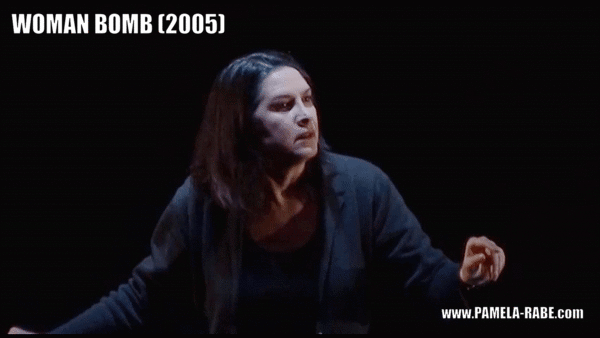Ivana Sajko’s play Woman Bomb presents the last twelve and a half minutes of the life of a female suicide bomber. What are the motivations, political and otherwise, that urge some women to ‘die to kill’?
Croation playwright Ivana Sajko, who grew up in Zagreb in Eastern Europe during a period of conflict and turmoil, describes her productions as ‘unbearably political’. While she’s not interested in overtly presenting contemporary politics on stage, it is the current rhetoric of politicians that she finds fascinating. Truth or otherwise, she says, has been abandoned in the interests of persuasiveness.
Performed by Pamela Rabe and directed by Jenny Kemp, Woman Bomb runs from 29 June until 17 July at Melbourne’s Malthouse Theatre. Translated by Tomislav Briev, it is the first English languge production of Sajko’s work.
A challenging, Croatian one-hander with Pamela Rabe is evidence of a new spirit at the Malthouse, writes Robin Usher.
There is not much that Pamela Rabe has not done as an actor, on stage or screen. But tomorrow’s opening of the play Woman-Bomb will mark the first time she has appeared at the Malthouse Theatre.
Croatian playwright Ivana Sajko, rear, with Pamela Rabe who performs Sajko’s one-woman show Woman-Bomb that concerns the thoughts of a suicide bomber.
Photo: Rodger Cummins
“These are exciting times,” she says referring to the revolution introduced by the Malthouse’s new director, Michael Kantor, who changed the name from Playbox and dropped the programming rule demanding all-Australian work. He programmed this winter season of one-person shows, which includes Woman-Bomb.
Rabe has long been associated with the Melbourne Theatre Company, for which she performed earlier this year in the summer hit, Things We Do for Love. But she is impressed by a new vibrancy at the venue created by staggered starting times, which results in people always milling around.
“Michael asked me to read the script and I was blown away by it,” she says. “But, at the same time, I had no idea about how it could be done.”
In consultation with Kantor and the Malthouse’s executive producer, Stephen Armstrong, it was decided to invite Jenny Kemp to direct.
“Jenny is careful about what she takes on, but the boys made it happen,” says Rabe, obviously impressed by the outcome.
She says there is nothing conventional about the script by the Croatian writer Ivana Sajko, 29. The first character in the play is the writer trying to imagine what it would be like to be a suicide bomber with 12 minutes 36 seconds to live.
“The bomber is in the same body as the writer and we go on a journey as Ivana grapples with what it would feel like to be a suicide bomber,” Rabe says. “There is the idea of a taboo being broken – the almost inconceivable idea that a woman could give birth to a bomb.”
Rabe says she was attracted to the play by the “sheer potency of the language”.
The playwright was discovered by writer John Romeril when he met Sajko in the late 1990s while tutoring at Interplay, an international gathering of young playwrights held every two years in Townsville.
“I’m keen to put hot young writers in touch with others around the world,” he says. “Most people wouldn’t know about this great playwright working away in Croatia.”
Romeril says Sajko would e-mail him translations of her latest work and he thought that Kantor might be interested in staging Woman-Bomb.
“The play refuses to be reductive or to judge what is ultimately a communal act,” says Rabe who has performed in a one-character play twice before – different productions of A Room of One’s Own, in which she played Virginia Woolf giving a lecture.

Although this was very different from Woman-Bomb, it gave her an insight into the differences in one-person performances, compared with bigger productions.
She remembers audiences becoming aware after about 10 minutes of the performance that no one else would appear on stage.
“After that, people coped in different ways. Some would fall asleep, but others would appear to become mesmerised and go into a deeper state of listening.”
She was aware of the same thing happening when she was in the audience during a performance of Alias Grace, the last Malthouse production, starring Caroline Lee.
“I could sense it during the performance that Caroline was asking for a different sort of contract with people in the audience.”
Rabe finds that relationship is more intense in a one-hander.
“The audience is my lifeline, because there is just me and the writer’s words in a constant loop with the people out there,” she says.
“I can’t afford to get lost in the performance because I have to stay connected with the people in the auditorium in some way.”
Rabe is in almost constant demand, but she will take a holiday after the Malthouse season before preparing for the Melbourne Festival premiere of a play by Brian Lipson, whose one-man show Large Attendance in the Antechamber won two Green Room awards. Then she will appear in a Sydney Theatre Company production of Chekhov’s The Cherry Orchard.
Source: theage.com.au
Photos by Roger Cummins, theage.au.net